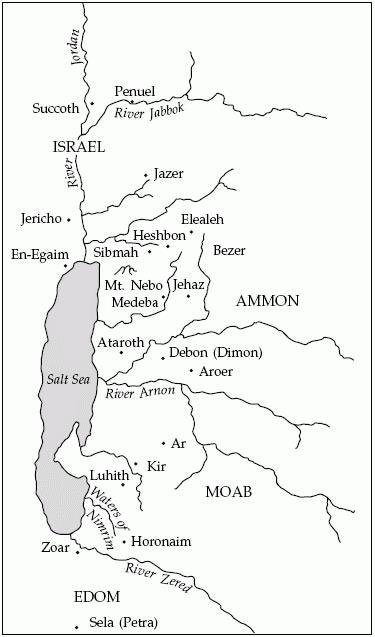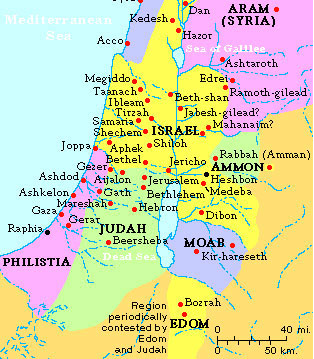
Territorial Pain; Isaiah 13-16
ZADOK PUBLICATIONS - Dr. C. R. OLIVER
August 1, 2014

|
You may watch this Newsletter in a video HERE.
ZADOK PUBLICATIONS MONTHLY NEWSLETTER
Introduction:August 1, 2014 Territorial Pain Isaiah 13-16 This month, we steer our study over four chapters reviewing several of the enemies of Israel. Beginning with Babylon in Chapter 13, it is necessary to point out, not only the accuracy of the Prophet, but the long timeline. (Sometimes the prophet reaches into the future for over 100 years and is "on the money" historically. This prompts biblical critics to declare there are many Isaiah writers who voice their work in this book. Don't believe them.) Chapter 13: Babylon! Isaiah 13:19
Like Sodom and Gomorrah, Babylon has been symbolically used as a depiction of luxuriant degradation and depravity. Often, Babylon has been associated with religious perversion (the Catholic Church for example). Sometimes, whole nations have been castigated with Babylon's name applied to government and financial systems. "The Babylonian System" most recently can be heard rattling from pulpits across the world in reference to Capitalism (as if Capitalism was inherently evil).
19 And Babylon, the glory of kingdoms, The beauty of the Chaldeans' pride, Will be as when God overthrew Sodom and Gomorrah. NKJV (Misappropriation of Scripture is so common today that the Spirit of Discernment must be used even in church.)Comment: Capitalism's roots were in the Reformation and its foundation supported by the Protestant Ethic. This is precisely why many Popes and Pentecostals join in array against its entrepreneurial freedom. Max Weber's old standby, Capitalism And the Protestant Ethic should be re-read before judging it. True, some of the associative aspects of ancient Babylon validate several of the above claims, but in the case of Isaiah 13, the prophet is talking about the ancient kingdom of Babylon, not some spiritual symbolism. Interestingly enough, he speaks nearly two hundred years before it exercises its power over Israel, even saying that its kingdom would fall by the conquering hand of the Medes (which were a "non-entity" during 740 BC). No wonder Ezekiel and Daniel and the three Hebrew children took courage in the face of their adversity-they knew the game plan of God by reading Isaiah. Historically, Nebuchadnezzar desecrated the Temple in 586BC and took away King Zedekiah, leaving Jeremiah standing in the muddle that remained. The Babylonians destroyed Israel and took as slaves the able bodied and intelligent, leaving the remainder to fend for themselves in the destruction. The prophet Isaiah hears from the Lord: "pay-back time" is on His agenda. Although God allowed Babylon to punish His people, He did not order Babylonian cruelty and it would be returned on their heads. (Read the account of Belshazzar's feast in Daniel 5 and its debauchery and how startled they were when the Medes broke through their security and annihilated them in one night.) The Medians had no mercy. They, and the Persians, pillaged, raped and burned. Isaiah saw it so clearly that his descriptions were as accurate to history as if he had been a reporter on the scene. Think on the last line of this scripture, "as when God overthrew Sodom and Gomorrah." This is the picture associated with Babylon! Revelation's reference to Babylon has THAT image. (In the case of Sodom and Gomorrah, God completely destroyed a sexually perverted [homosexual] community sparing only Lot and a portion of his family. (See: Leonard Ravenhill's book, Sodom had no Bible.)Isaiah 13:17-19 Review the verses prior to these verses. It is the Lord who assembles the ravenous army. Observe the extent of this tumultuous time.Isaiah 13:6 Wherever evil, iniquity, arrogance, pride and haughtiness abound, count on it-God will come on the scene. Those characteristics elicit the following treatment.Isaiah 13:11 Those who would overthrow Iraq and occupy physical Babylon have not met the true God of the universe when He was stirred to anger. Babylon fell in a day under the kingship of Belshazzar; its heritage was onerous.Isaiah 13:15-16 The exactness of this prophecy is startling. It beckons modern prophets to either be specific and abandon their nebulous jargon or cease claiming the office. Modern Prophets, give us dates, times, exact situations or persons or shut up!!! Chapter 14 Words against the King of Babylon, Assyria and Philistia: (A continuation of the prophecy against ancient Babylon [modern Iraq]). Isaiah 14:22 "For I will rise up against them," says the LORD of hosts, "And cut off from Babylon the name and remnant, And offspring and posterity," says the LORD. NKJV Isaiah opens this chapter with encouragement for the people of God (BEFORE they are taken captive). He tells them they will return from Babylon and be blessed in the "land of the Lord." Israel will take captive those who captured them and make servants of them. Israel will have rest, peace and prosperity from the hand of the Lord. THEN, they will openly triumph over the King of Babylon with their words and judgments. Israel is made to realize how much the Lord loves them. Far in advance of their troubles is the promise of restoration and victory over their enemies. THAT is a picture they had to carry into their captivity and why God advises to, "Count it all joy." The sequence of Scripture offers a prelude and postlude to their captivity. As a prelude, there is much shouting and joy in both Chapter 12 and Chapter 14.Isaiah 14:1 AGAINST BABYLON AND ITS KING Part of Israel's restoration was giving them the fruit of their lips. What they say of the King of Babylon will come to pass. They had to speak it by faith in order to see it crystallize into fact. The Prophet gave them words from God, and they had to take up those words and put them into the atmosphere of their confession. (Below is a summary of what they are to say while ending it with this declaration:)Isaiah 14:3-4 Notice what this proverb covers.Isaiah 14:23 l. They declare the end of Babylon's beauty and its ruling King (v. 4).A favorite passage for many preachers is this parallel drawn between satan and the King of Babylon. (I suppose equating national leaders with the devil is not a new phenomenon.)(Who caused this to come to pass?)2. The earth itself rejoices when the evil ones are cut down with no hint of return. Please notice God's reason for such action:Isaiah 14:16-175. Note the contrast between the King of Babylon and the other world leaders. AGAINST ASSYRIA:Isaiah 14:21 In the book, Sealed Unto His Coming, I go into detail about the sovereign seal of God on certain events in history. One may not pray against them, seek the Lord to change His direction or try to influence His opinions. Notice now His reasoning: He wants to punish them over His land (v. 25). Is this why He is gathering folk over Israel today? Are we to note verse 26? This prophetic word was written before the rise to power of the Assyrians. The Lord did to them exactly as He promised. What is He promising today? What is He saying to you?Isaiah 14:24-27 AGAINST PHILISTIA When King Ahaz died, the surrounding nations saw this as opportunity to make moves against Israel-exploiting the situation. God reminds them, "He is in charge." This is a promise and not a threat! God gave promises to His beloved Israel in this chapter and also to the enemies of Israel. The Lord alone is able to warrant these words. He reminds Philistia that in His eyes, "They are toast." He has determined "appointed times" for each of them.Isaiah 14:32-15:1 Nations would do well to realize their corporate mortality. What is God decreeing over your country? Throughout this chapter, He re-iterates His love for His people and reminds them that though they may be surrounded by their enemies and sometimes invaded by the enemy, they are still HIS CHOSEN. Chapter 15 "Geographic Exactness" Isaiah 15:7-8
Therefore the abundance they have gained, And what they have laid up, They will carry away to the Brook of the Willows. 8 For the cry has gone all around the borders of Moab, Its wailing to Eglaim And its wailing to Beer Elim. If one will dare examine a map of the area occupied by Moab, it will become plain the prophet is calling the roll of cities and places destined for destruction. Moab, comprised of the descendants of Lot's incestuous relationship, (and the Edomites) are targeted by God for punishment and not without reason. In preparation for the prophetic word of Chapter 16, this chapter clinches the fist of God around the throat of Moab and incorporates everyplace and everything they treasure. (As one reads the list of places, try and spot them on the maps below and realize that some of the places mentioned have faded away and are not ascertainable due to many factors, including God's judgment.) 

Isaiah is geographically correct and shows his knowledge base is specific and irrefutable. When judgment begins to be realized in homes and villages, there is much weeping. There is weeping in the idolatrous Temples, weeping among the citizenry in the streets and even weeping among the military personnel. So much weeping is heard that it affected the heart of the prophet, and he weeps for their plight. (Oh, that modern prophets might be found weeping.)Isaiah 15:1 Like a volcanic inferno engulfing first one city then another, the fury of the Lord covered the land of Moab.Isaiah 15:3 The intricate details concerning every town and village flowed in front of Isaiah with graphic accuracy. The panorama moved him. Nonetheless, his office required his voice to be heard and, perchance, heeded!Isaiah 15:7-9 From this chapter, Isaiah launched into Chapter 16. He is a credible witness and Israel must hear! Chapter 16 Moab is punished and Sanity Returns Isaiah 16:5
A hundred years before Isaiah's time, Obadiah prophesied the demise of Edom (descendants of Esau). At that time the capitol at Petra was a prosperous city in the mountain pass. They habitually harassed Israel, charged the people of God exorbitant fees for supplies and tattled their whereabouts to surrounding armies and enemies. Now, the tables are about to turn and Isaiah weeps for what he sees. Isaiah rightfully prophecies that within three years their time will be up and all protection from God will be "hands off."
In mercy the throne will be established; And One will sit on it in truth, in the tabernacle of David, Judging and seeking justice and hastening righteousness. Isaiah urges them to make two basic changes: first, to start back paying tribute to Israel and second, offer the Jews protection while in their territories. Isaiah knew their pride and arrogance would not allow them to take the offer, but God offered it nonetheless. "He is good and His mercy endures forever." Sheep were the common animal used for tribute in ancient times. Isaiah is telling the Moabites, you need Judah's protection against the Assyrians, but you are not aware of it. Send tribute from all sections of your country. Send lambs from the farther outposts of the kingdom, as well as, points near to them. Give abundantly to Israel in order to garner their favor and show your servitude to them.Isaiah 16:1 At this junction, Isaiah contrasts the Daughter of Zion vs. the Daughter of Moab. (Daughters refer to the entire people of a land.) The prophet counsels Moab to "shadow and hide the outcasts." Stop betraying the persecuted ones. "Be a shelter to them who run from the 'spoiler.'"Isaiah 16:1-2 Isaiah gives some ultimatums to Moab if they are to be spared: "Extortion has come to an end! Devastation must cease! Oppression must be run out of the land!" Looking into the future, he counsels Israel to know their kind will cease unless they change. One is coming to the throne of David who will see to it. He will rule in justice and righteousness and none of the former ways will be able to continue. Get right with God NOW! The whole world knew bad things about Moab. Their reputation for pride, arrogance and their lying lips preceded them. Because of their rancor, their land will suffer if they turn this final offer down. Knowing that the Assyrians will conquer and take away the Northern Kingdom, Isaiah prophesies that within three years, the Assyrians will come for Moab. He sees "The Lords of the nations," breaking them down. In verse ten, he counts their awesome fate. He begins to weep with tears flowing down his cheeks as he counts what will happen if they fail to repent (v. 9). Again, in verse eleven, his emotions overcome him and Isaiah becomes what is lacking in modern prophets. Identifying with his subjects, his frame quakes as tears roll down and he retches from the inner depth of his being (because of what he sees). He says the day will come when all hope will have vanished and they will run to their idolatrous temple and cry out for deliverance, but there will be no help. Solemnly, Isaiah rises to the heights of power and declares his message is an Oracle of God. "The years of a hired man" are determined by legal document (outlining in advance, the extent of his labors, his starting date, his tenure and the date of release). Yep, the prophet did what few do today, he gives times and limits according to God's calendar.Isaiah 16:14 There are time limits with God. His world is not a disorganized mess breaking loose here and there. Its times and seasons are determined and whether or not the nations hear the cry of the prophet of God or the siren sounds of satan is up to them. Their destiny depends on the road they take. From Petra, two roads were dominant: a road to Damascus and a road to Jerusalem. Perhaps the choice of roads is what caused the Lord to focus on Syria in the next chapter. Until Next month, Dr. Cosby R. Oliver, PhD. |
Zadok Publications
P.O. Box 132874
The Woodlands, Texas 77393
(936) 230-3543
Email: zadokbookstore@zadokpublications.com
On The Web: ZadokPublications.com
Paperback volumes may still be ordered through our website.
To see the currently available books from Amazon, click on the cover images below.
In Spanish:
In German:
To see the currently available books from Barnes & Noble, click on the cover images below.
In Spanish:
In German:
Last modified: 02/04/2019